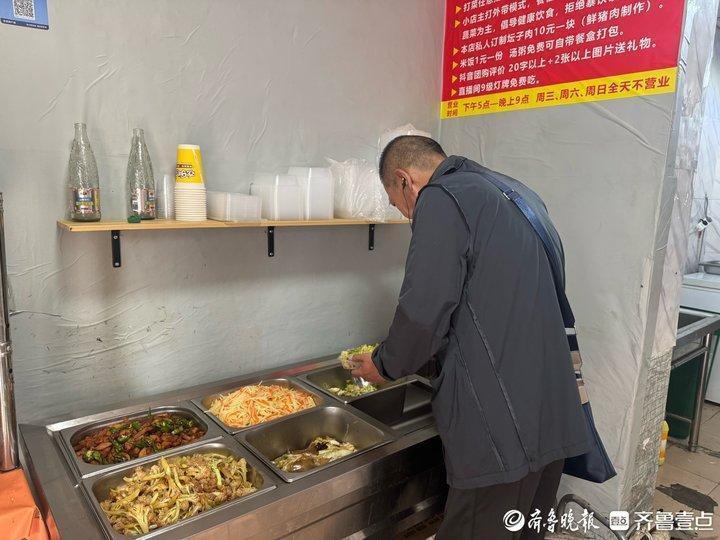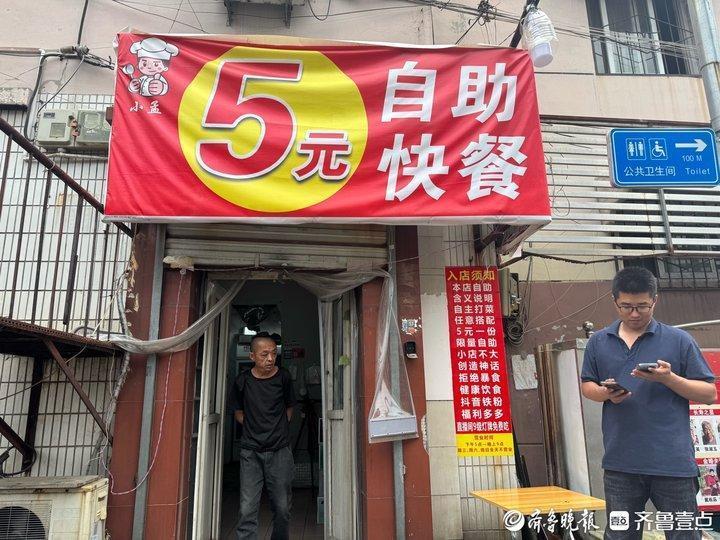Recently, a self-service fast-food restaurant in a small alley in Jinan’s Tianqiao district went viral due to a negative review complaining about “too little food.” Many netizens humorously rallied behind the restaurant, calling it “unfairly treated.” On May 23, a visit was made to this fast-food spot to learn more.
A tiny shop packed with just three customers
Nestled in the winding alleys off Lishan Road lies Liuxing Village, one of Jinan’s few remaining urban villages. Just a street away from Daming Lake, a young entrepreneur named Xiao Meng runs a CNY 5 self-service fast-food restaurant.

(Xiao Meng is the person on the right)
At 4 p.m., Xiao Meng was busy stir-frying shredded potatoes, sweating as he prepped for the evening rush. The restaurant is tiny—just about ten square meters—with the kitchen taking up most of the space and two folding tables filling the dining area.
“Most orders are takeout, but you can eat in. It’s tight—three people, and it’s full,” Xiao Meng joked. Each evening, he prepares 6-8 seasonal vegetable dishes for CNY 5 per serving, with rice costing an extra CNY 1. “Many delivery riders and construction workers eat here. I want to offer affordable, filling meals,” he said.

Soon, more customers arrived. “What’s on the menu today?” “There’s meat today—almost ready,” Xiao Meng replied while cooking. One regular buys meals here nearly half the month.
Even before going viral, business was steady. “We open at 4 p.m. and sell out by 9 p.m. daily.” But Xiao Meng never expected his tiny shop to attract so much online attention and warmth.
A negative review sparks online debate
Three months ago, Xiao Meng was in a rut. “After graduating, I struggled and ended up working part-time at a food company. I’d just play video games after work—no direction.”
This area is a hub for migrant workers. Seeing young workers eating simple meals, Xiao Meng realized there was a need for affordable fast food. With limited funds, he rented a small space for CNY 830 a month and set prices at CNY 5 per meal. He promoted his shop through short videos and online deals.

Last month, a negative review called the portions “too small and expensive.” Initially upset, Xiao Meng kept working until his “three-person seating” video went viral—bringing attention to the review.

Netizens flooded the comments with jokes: “Do you serve emperor crab for CNY 5?” “I’ll take a medium-rare steak.” Some even added “Australian lobsters” and “Buddha Jumps Over the Wall” to the menu as pranks. Xiao Meng laughed along, saying, “Who knew being roasted could feel so heartwarming?”
Strangers send “luxury additions”
“One bad review did more than a month of promotion,” Xiao Meng joked. Fans started visiting his shop, some sending gifts like chicken tail drinks, homemade bacon, and beef to “upgrade” the menu.

Others left heartfelt messages: “Flying to Jinan next week with hometown yellow beef,” “Sending you some stir-fried crabs.”</p




